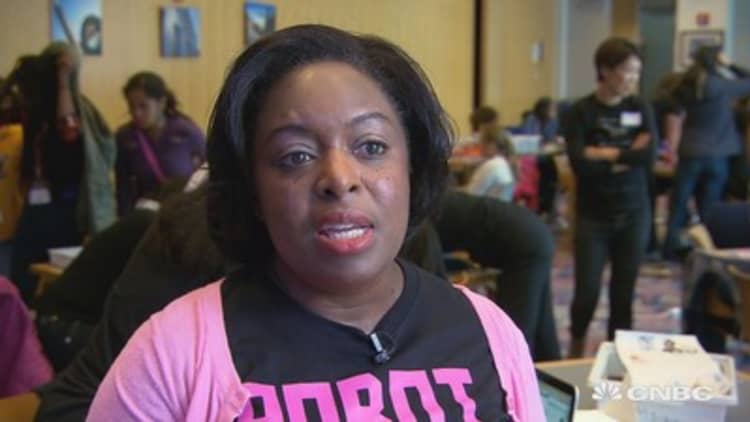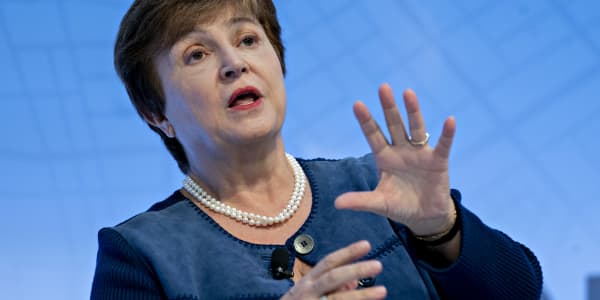As much as preschool is about giving young children a head start in learning, it's also about economics. For New York City, one of the country's largest and most racially segregated school districts, the start of free preschool for all 4-year-olds has major financial implications moving forward — and some working parents are already feeling it.
Nettia Caldwell is a single mother who works full time while completing an online bachelor's program at the University of North Carolina, Asheville. Universal pre-K for her son Jonathan means that she can continue working and studying.
"Universal pre-K is so important for working parents," she said, seated in the library of the Little Star of Broome Street Early Childhood Center in Manhattan, where her son is enrolled in a low-cost program for 3-year-olds. When he turns 4, he can enter universal pre-K.
"Without school for my son, I wouldn't have enough time to work full time, study and teach him things," Caldwell said.
Kids who get quality pre-K education earn anywhere from $9,000 to $30,000 more over their lifetime than those without it, according to a December 2014 White House report. Some experts say that number is closer to $50,000.
Children with preschool education are also more likely to own a home later in life and are less likely to get in trouble with the law, the White House report found. Local officials in Texas and multiple counties in North Carolina are looking to roll out a free preschool program of their own.
"Now I have my own money. I don't need to get help from any benefits," said Barbara Macialek, a Queens resident who works full time at a restaurant. "Everything has changed because my son is at school, I had time to find a job."
Her 4-year-old son, Mark, is enrolled at the Long Island City YMCA, which she said he loves. She pays about $300 each month for him to stay longer than the city-wide school day of six hours and 20 minutes for universal pre-K.
"[Universal pre-K] bolsters two generations, sometimes three, at the same time," New York Civil Liberties Union Executive Director Donna Lieberman said. "A good pre-K program provides support for the parents by giving them tools that they need to nurture their children, in addition to opportunities to work or pursue education."
While some education centers offered free pre-K services before universal health care, many parents had to either stay home, rely on a friend or family member or pay for care themselves. Prices for private pre-K education can run more than the college tuition. Schools like the Calhoun School and the Ethical Culture Fieldston cost over $40,000 for full day pre-K while the Brooklyn Explorers Academy costs $26,000.
Hannah Brown, from the Laconia neighborhood in the Bronx, is a grandmother of three children, all of whom went to private day care because universal pre-K in New York didn't exist at the time.
"You're completely wiped out," she said. "Private care is expensive even for middle income families. Middle income is nothing if you have to pay $500 or $600 a month for care, especially with rent and everything else."
The cost of the program is about $10,000 per child, a large upfront cost to taxpayers. But for every dollar spent on early education, taxpayers save $13 on future costs and generate $3 in net business and economic value, an MIT analysis showed.

But free preschool in such a huge city is not without problems. Right before the initiative rolled out, several schools closed for not meeting city standards, leaving many parents scrambling to navigate the enrollment paperwork. Since then, some schools have been shut down due to health violations.
And for school administrators and early education teachers, adjusting to new demands has been a lot of work.
"It was a big change for us. It's been really beneficial, but it was also overwhelming," said Mary Cheng, early childhood program director at the Little Star of Broome Street Early Childhood Center.
Adjusting to a new curriculum and explaining the details of funding as well as what is and is not included in universal pre-K was difficult, according to Cheng.
"It was a lot to wrap my head around," she said.
Funding policies have had an unintended consequence on classroom learning. Funding from the Administration for Children's Services or Head Start makes it possible for lower-income children to attend pre-K programs that offer additional hours of child care beyond the regular day. Because the funding source for those students is different than that for other children, students sponsored by these programs are often taught in separate classrooms.
The staff at Park Slope North-Helen Owen Carey center were told that they must enroll ACS-funded and nonqualifying students in separate classrooms, according to a report. The school and NYC Department of Education did not return a request for comment.
Still, parents and experts alike have said that the benefits of having universal pre-K outweigh the problems that come with it. Experts said that in developing new programs, promoting diversity should be a top priority.
"The more that people are exposed to people who are not just like them, the more tolerant and respectful we become as a society," the NYCLU's Lieberman said.
Watch CNBC's "Power Lunch" each day this week to see the work being done to bridge America's divide.







